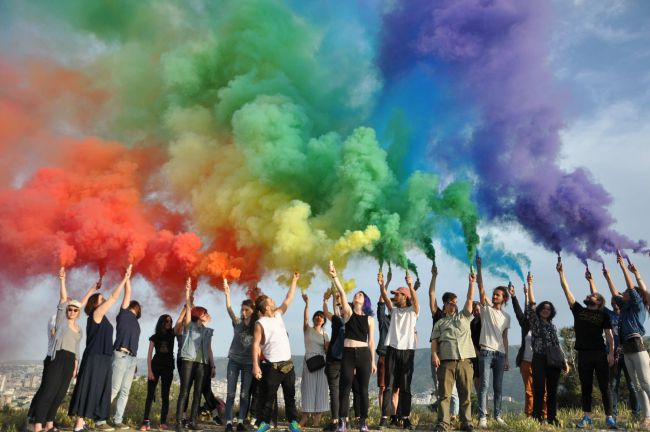Report by Eurasianet
The original reports contain more pics and videos, not reproduced here
Activists ceded the streets to homophobic priests and neo-Nazis.
Gay rights groups in Georgia called off a planned rally on May 17 after threats of violence, but individual activists still came out to rally. (Photo: George Gogua)
May 17 is International Day against Homophobia, Transphobia and Biphobia (IDAHOT), and Georgia’s embattled gay community and activists often try to hold various public events on the occasion. This year several advocacy groups and activists announced that they were planning to gather in front of the prime minister’s office to “remind the community of the destructive consequences of hate.”
But after watching police barely contain far-right mobs from attacking liberal protesters a few days earlier, LGBT rights activists said the city’s downtown would not be a safe place to demonstrate. “We decided to concede our constitutional right of the freedom of expression this time […] not to let these forces create tension,” LGBT rights activist Giorgi Kikonishvili said on a Facebook live broadcast on the eve of the rally.

Over the weekend, club-goers and liberal protesters took to Tbilisi’s central Rustaveli Avenue after police carried out violent raids against two popular nightclubs, ostensibly to crack down on drug dealing. They were met by far-right counter protesters, and violence was barely averted.
The near-riots marked an escalation in the country’s deepening culture war, where Georgia’s increasingly vibrant, liberated and internationally famed nightlife – and its liberal attitudes towards drugs and sexuality – is a frontline.
The weekend’s turmoil set the stage for a tense sequel, as Georgian conservatives planned to come out again for counter protests against the IDAHOT events. Priests and their parishioners, ethno-nationalists and even white supremacists had all been planning to head downtown to rally, divided in their tactics but united in their disapproval of Georgia’s small gay-rights movement.
Heavy police forces, too, were to be deployed to act as a human shield against potential clashes as they were over the weekend. But IDAHOT organizers said they didn’t feel that was enough.
“On the formal level, the Interior Ministry gave us safety guarantees, but in the light of recent events and based on our past experience we did not trust them,” Kikonishvili told Eurasianet.
Small groups of LGBT activists did hold hit-and-run rallies in front of various government buildings, protesting the government’s inability to protect them. In the late evening, several dozens protesters, defying the cancellation of the main rally, gathered in front of the prime minister’s office, holding posters reading “No to Homophobia!” and “No Fascism!”

Police blocked off the access to the area with metal shields to avoid attacks. “We are citizens of this country and we are members of this family,” said activist Nino Bolkvadze. “We are not going anywhere.”
But after the LGBT activists took a step back, so did an ultranationalist movement, Georgian March, which had planned a rival demonstration; leader Sandro Bregadze said Georgian March was going to join events organized by the Georgian Orthodox Church.
Critics charged that the absence of the LGBT activists in Tbilisi’s streets on Wednesday and the earlier tensions spoke to the Georgian authorities’ failure to ensure freedom of expression to all parts of society. “[T]he authorities have a duty to take actions, and strengthen security to protect a threatened group of people,” Giorgi Gogia, South Caucasus director for Human Rights Watch, told Eurasianet.Police did detain four members of openly neo-Nazi groups, who were seen giving Nazi salutes in central Tbilisi today.
That left the Georgian Orthodox Church to carry the day. Church officials notoriously attacked LGBT protesters during Tbilisi’s IDAHOT commemorations in 2013. Since then, the Church has been marking May 17 as the “Day of Sanctity and Integrity of the Family” in an apparent attempt to drown out the voices of the LGBT community and to show who is the bigger force in the devoutly Christian country.
This May 17, Georgian clergy marched through Tbilisi’s downtown in a liturgical procession. The church also organized mass weddings – between men and women, naturally – across the country. As many as 500 couples got married, 50 of them in the main Cathedral of the Holy Trinity in Tbilisi, the church said.
Top clerics took the occasion to castigate both the LGBT groups and drug-liberalization activists.
“The war against family and its values is a war against God,” said Archbishop Shio, the locum tenens of the aging pontiff of the Georgian Church, Patriarch Ilia II, in a morning sermon. He called for treating drug addicts but preached against the idea of drug liberalization. “Narcotics are a great sin, poison and evil […] we need to fight against them,” he said.
On the same subject, a comprehensive report by OC Media
The original reports contain more pics and videos, not reproduced here
Queer rights activists held a number of small ‘guerrilla demonstrations’ in Tbilisi on Thursday to mark International Day Against Homophobia, Transphobia, and Biphobia. Conservative and far-right groups held their own events, vowing to create a ‘Georgia without sodomy’, with the Church organising their own event for ‘family values’.
A major queer rights rally which was originally planned for 17 May was cancelled the day before, with activists citing security concerns due to ‘an unprecedented mobilisation of hostile groups’, who they believed were getting ready for ‘unrest and civil confrontation’.
[Read more on OC Media: Queer rights activists cancel Tbilisi 17 May demonstration after ‘threats from far-right groups’]




Instead, queer rights groups organised several unannounced demonstrations in front of various government buildings, reading out their demands to the corresponding branches of government and lighting flares in the rainbow colours.
Activists demanded the authorities prevent hate crime and publicly condemn homophobia and transphobia, to make it easier for transgender people to choose the sex marker in their identity documents and make sex reassignment surgery available to them, protect intersex people from dangerous medical procedures, and to stop homophobic bullying in schools.

The final rally was held in front of the Government Chancellery under heavy police presence, with all roads leading to the venue closed by police and only selected people allowed to cross the cordons. It was attended by approximately 100 people, including queer and civil rights activists and opposition politicians.
Despite the security measures, one speaker at the rally was physically assaulted, with his attacker immediately detained by police. His attacker, who according to Liberali was under the age of 18, will still be prosecuted under the criminal code.


Conservative and far-right rallies
As the final rally unfolded, small groups of people including priests gathered in front of the police lines protesting against ‘LGBT propaganda’.
Several rallies were held by conservative and far-right groups throughout the day under the pretext of marking the Day of Family Purity — an observance established by the Georgian Orthodox Church in 2014, a year after priests led thousands of violent demonstrators to attack up to 50 peaceful queer rights activists on 17 May.
Neo-Nazi group the Nationalist Socialist Movement — National Unity of Georgia and their supporters marched through central Tbilisi in the morning giving Nazi salutes and chanting ‘glory to Georgia, glory to heroes’, following which the group lit candles in Kashueti Church.

Neo-Nazis marching down Rustaveli Avenue chanting ‘glory to Georgia, glory to the heroes’ (Mari Nikuradze/OC Media)
The Georgian Orthodox Church distanced itself from neo-Nazi groups earlier in the week after they appeared to endorse a violent counter-protest on 12–13 May against a protest against nightclub raids.
[Read more about the nightclub raids and protests on OC Media: Interior minister apologises over Tbilisi nightclub raids as far-right groups plan daily protests]
A large rally organised by the Georgian Orthodox Church to mark the Day of Family Purity passed through central Tbilisi at around noon carrying icons and posters with slogans against drugs and promoting heterosexual families. The rally also included a large number of children.
The numbers attending this year’s rally were less than in previous years.



As the rally was underway, a mass wedding was held in Tbilisi’s Holy Trinity Cathedral. The Patriarchate’s Chokhosnebi, a conservative group famous for wearing the traditional Georgian male dress the chokha and advocating ‘Georgian traditions’ and ‘family values’, who organised the event, previously announced that 400 couples would be married on that day in churches throughout the country.


Another gathering was held in the afternoon by the far-right March of Georgians group. Speakers demanded a halt to ‘drug and LGBT propaganda’ and threatened to use violence if ‘provoked’ by queer rights activists, chanting ‘Georgia without sodomy’. Several members of the group were detained during the day and the group’s leader and former deputy minister in Georgian Dream’s government, Sandro Bregadze, demanded their release before the rally would disperse.
‘Family Purity Day’
In 2013, a small group of around 50 queer rights activists were confronted in Tbilisi by thousands of counter-demonstrators led by Georgian Orthodox priests. Demonstrators carried posters with homophobic messages such as: ‘We don’t need Sodom and Gomorrah in Georgia’.
The crowds, some carrying nettles to beat queer rights activists, broke through police lines to attack the activists. Police were forced to evacuate the small number of activists from the city centre to avoid further violence.
Last year, the Church held a counter-rally from Tbilisi’s central Rustaveli Avenue to the Holy Trinity Cathedral in support of ‘family values’. The rally was attended by several thousand people.
International Day Against Homophobia is observed annually in more than 120 countries on 17 May. The date was chosen to commemorate the World Health Organisation’s decision in 1990 to remove homosexuality from the International Classification of Diseases.

Homophobic violence in Georgia
In 2017, the Prosecutor’s Office examined 86 alleged hate crimes, 12 of which were based on sexual orientation and 37 on gender identity.
The Public Defender’s 2018 report said violence against queer people, whether in the family or in public spaces, is a serious problem, and that the government has been unable to respond to this challenge.
The report said the Public Defender received numerous complaints regarding homophobic attitudes from law enforcement officials.
‘In some cases, complainants withdrew cases and refused to cooperate with the general inspection or the Prosecutor’s Office because they didn’t believe an investigation into their cases would be timely’, the report reads.
The report said transgender women in particular often appeal to the Public Defender’s Office about violence they face.
‘Unfortunately, law enforcement officials don’t have an efficient strategy against hate-motivated violence. They react to individual cases and don’t take action against the systematic problem’, the report reads.



